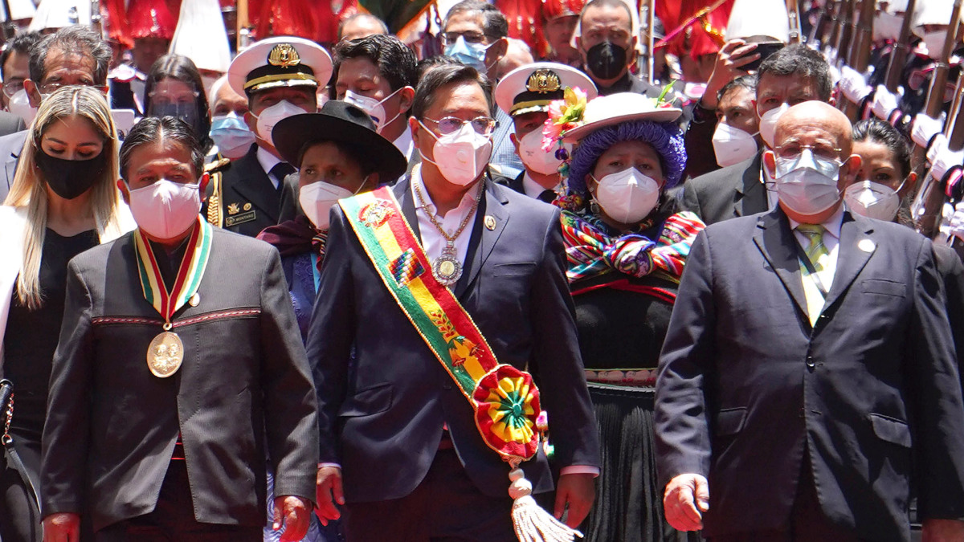
As a warning to potential coup planners in other Latin American countries, the new government of President Luis Arce—elected in a landslide in October—will not adopt a “forgive and forget” attitude toward former dictator Jeanine Áñez and her key cabinet ministers.
On the contrary: Barely ten days after the election victory, the Chamber of Deputies and the Senate approved a final report on the “massacres of Senkata [and] Sacaba.” The report recommended that Áñez be prosecuted for genocide; it also proposed criminal indictments of 11 of her ministers.
Senate President Eva Copa specified that the report would be submitted to prosecutors for possible proceedings.
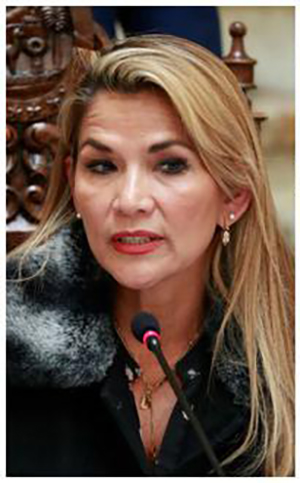
Several of the coup-makers, including dictator Áñez, key cabinet ministers and top military officers, have been detained temporarily and prevented from leaving the country as the new anti-corruption prosecutor, Luis Atanacio, prepares charges. Proceedings are ongoing but have been delayed due to the coronavirus epidemic.
MAS (Moviemiento al Socialismo), the party of former president Evo Morales (2005-2019), recaptured the government in the October election with 55% of the vote (3.4 million voters). It won 75 of the 130 seats in the Chamber of Deputies, and 21 of 36 seats in the Senate.
MAS however did not accomplish a two-third majority as during Morales’ tenure.[1]
With Luis Arce (Morales’s former minister of economy and public finance) as president and David Choquehuanca (Morales’s former foreign minister) as vice president, it is expected that Bolivia will once more champion the policies of Morales that made him the most beloved leader in Bolivian history.
According to the Council on Hemispheric Affairs, Morales ended the 500-year-old system of apartheid against Bolivia’s indigenous peoples (who comprise a majority of the population), made Bolivia the fastest growing economy in Latin America, cut the poverty rate almost in half, boosted the minimum wage five-fold (from approximately $57 a month to $287 a month), reduced illiteracy virtually to zero, and raised average life expectancy from 64 to 71.
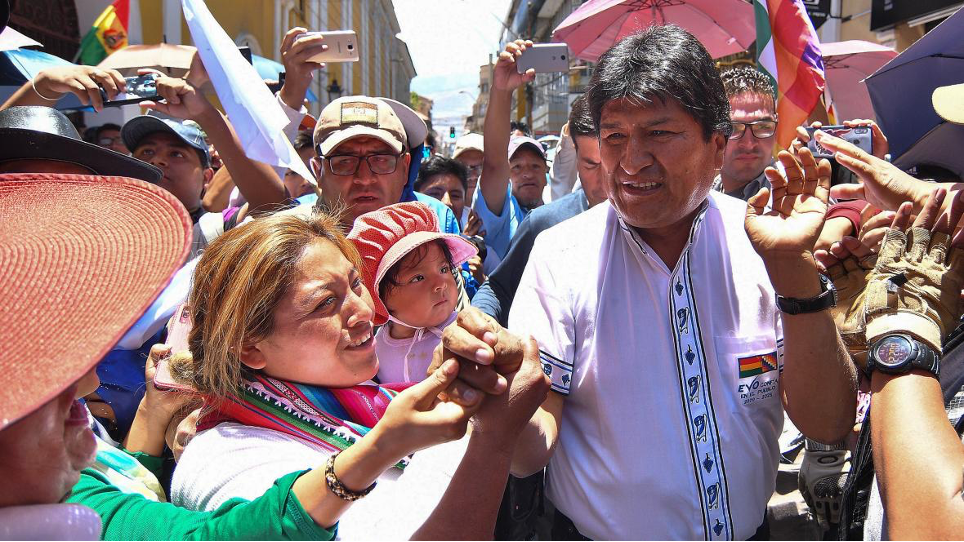
Despite winning re-election in 2019 (for a hotly contested fourth term), Morales—shortly after the election—suddenly “resigned,” fled the country, and sought asylum in Mexico.
Morales did so after Bolivia’s army chief, General Williams Kaliman, who was allegedly paid a $1 million bribe by the U.S. charge d’affaires in Bolivia, publicly announced that military officials were “suggesting” to Morales that he resign.
In Latin America, such suggestions from the military are not taken lightly by politicians who wish to go on living, especially since, as Morales asserted, a price of $50,000 had been put on his head by “coup plotters.”
For several days prior to the coup, right-wing hoodlums spearheaded violent rampages against indigenous Bolivians and MAS members. They burned the houses of Morales, his sister, and other MAS politicians.
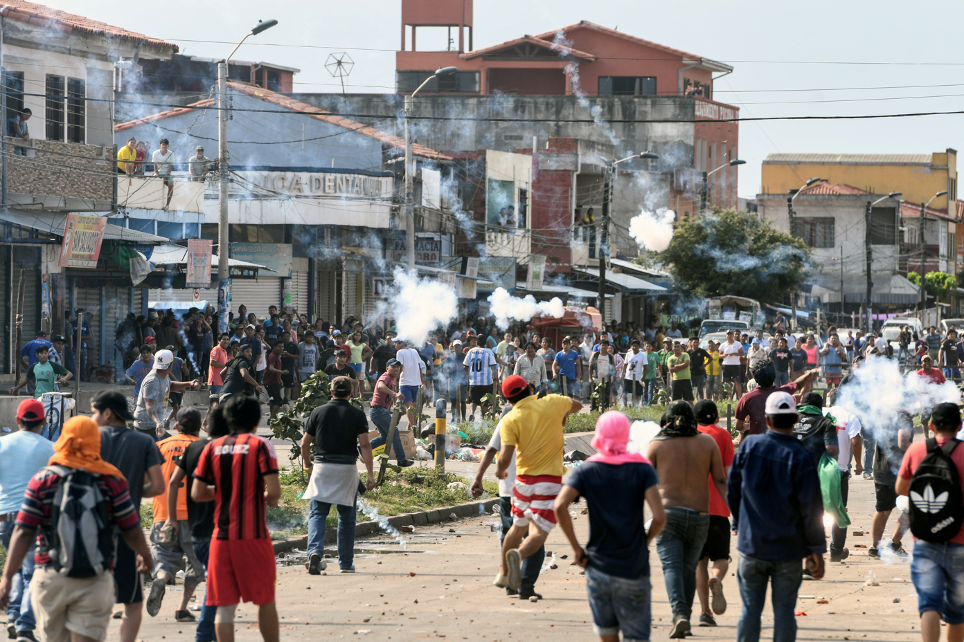
Security forces delivered the coup de grace. Police mutinies began on November 8. Two days later Morales departed along with other MAS officials and parliamentarians. Morales indicated he wanted to spare the country bloodshed.
To replace Morales, the military installed Christian fundamentalist Senator Jeannie Áñez as interim president. She was quickly recognized by the U.S. and Latin America’s right-wing governments, all of whom refused to call Morales’s ouster a coup.
Áñez’s rule was marked by authoritarian assaults and a pattern of insults to Bolivia’s indigenous peoples. She called Ayamara’s celebrations “satanic,” which gave a helping hand to racists who burned indigenous peoples Wiphala flag. Within days of her government, pro-Morales protestors were shot to death by military soldiers and helicopter gunners. At least three dozen anti-coup activists, mostly indigenous people, were murdered during the year-long dictatorship.
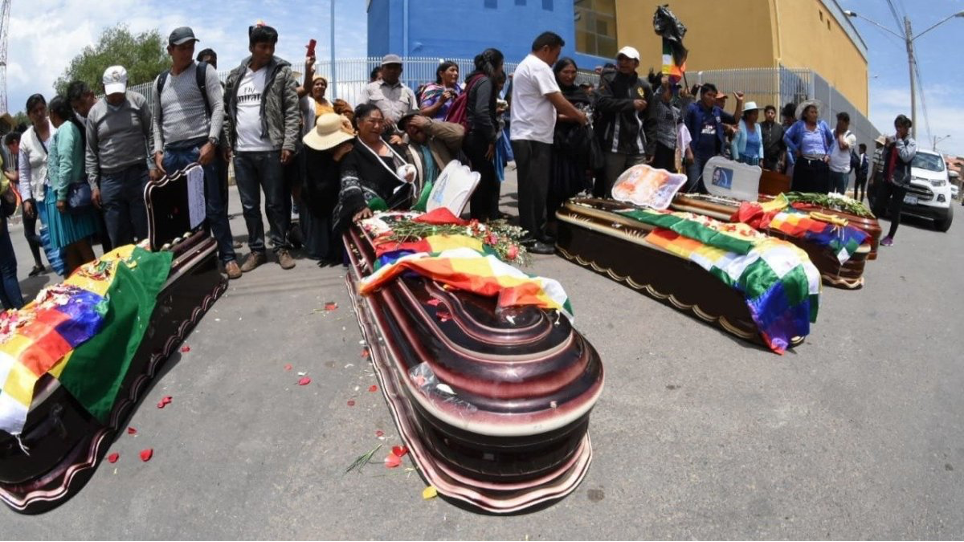
New Government Orientation
With the return of MAS to power, the question is how fast and how effectively the new government can reverse the disastrous economic and social policies of Áñez. Bolivia’s coup government left the people with a foreign and domestic debt of 4.9 billion dollars. The coronavirus pandemic and dictatorial rule—marked by regressive economic policy, cuts in taxes for the rich—is predicted to cause a 6% economic contraction, accord to World Bank forecasts for 2021.
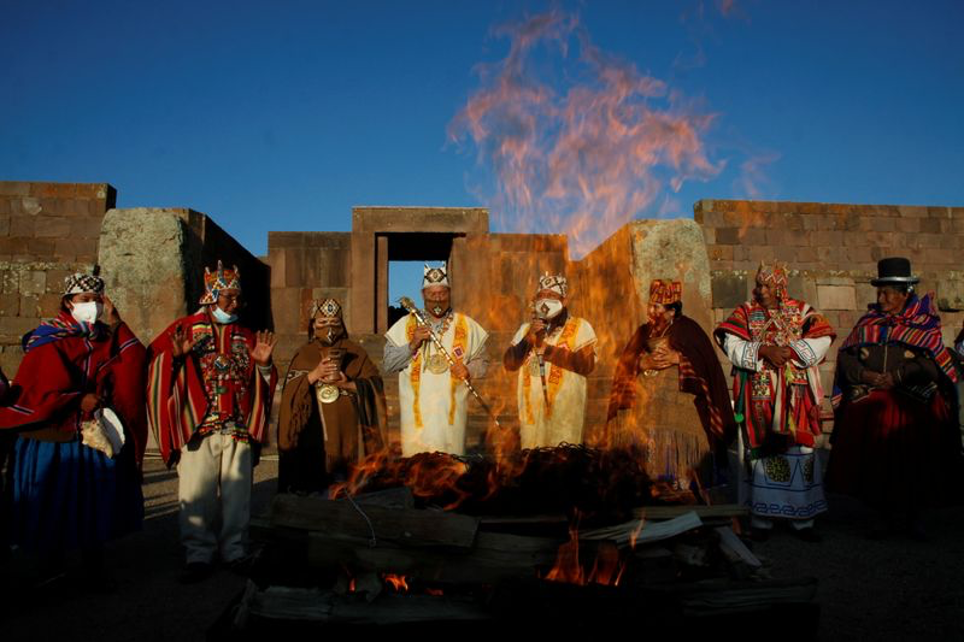
Luis Arce was born into a middle-class family of teachers and earned his university degrees in economics. During the first decade as Morales’s head of economy, Arce helped oversee the nationalization of natural gas and oil, and reduction of extreme poverty from 38% to 17% of the population.
Arce is not considered to be indigenous and is a Marxist.
“I have had my ideas since I was 14 years old and I started reading Karl Marx. Since then I have not stopped having the same ideological position and I am not going to change for anything,” Arce told Reuters in an interview in October.
As economy minister under Morales, Arce pushed for nationalization of many sectors, which steered Bolivia to an average annual growth rate of 4.6%, one of the best in Latin America. Bonuses were paid to pregnant women, school children and the elderly, and huge investments were made to industrialize natural gas and lithium for batteries and nuclear energy.
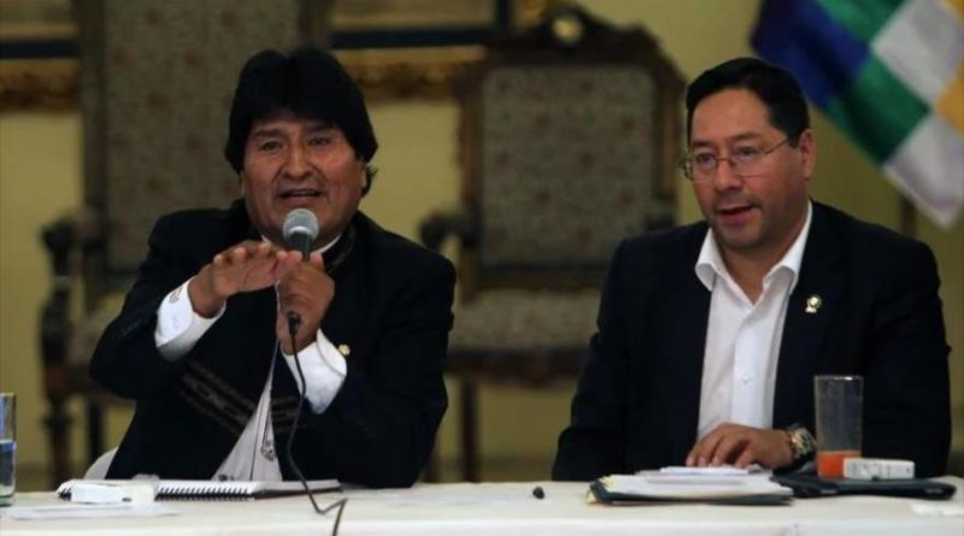
Arce has reinstituted a new “Bonus against Hunger,” which will help more than four million people. The beneficiaries will be people over 18, who do not receive income from public or private institutions, people with disabilities, mothers, and people who collect the Universal Bonus.
Arce has promised not to cut public spending despite acknowledging that some austerity measures will be needed. He also declared the “process of change [will be resumed] without hate, and learning and overcoming our errors as MAS.”
Half of all revenues still come from natural gas and oil. Agricultural production is second. Arce wishes to diversify the economy. He has stopped the exportation of food, in order to assure that all Bolivians are well fed. He has fixed the currency rate of exchange to curb inflation.
“With a new [U.S.] government we predict better relations that will translate into the well-being of our peoples,” Arce wrote on his Twitter account.
The Obama government cut off ambassadorial relations upon assuming the presidency in 2008, and Morales subsequently expelled the Drug Enforcement Administration (DEA) and United States Agency for International Development Agency (USAID), which he accused of “seeking to conspire against the Bolivian people and his government.”
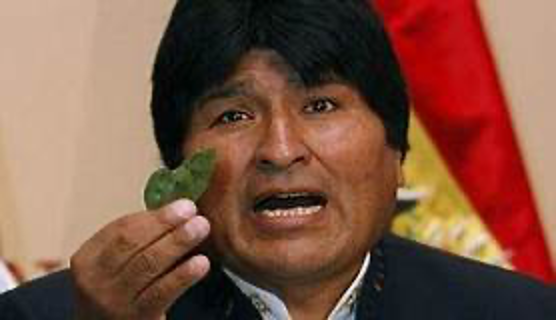
The expulsion followed remarks by Secretary of State John Kerry who stated that “the Western hemisphere is our backyard, its critical to us.” Morales said that these comments reflected the fact that the United States “still has a mentality of domination, of subjugation.”
The new vice-president David Choquehuanca, leader of the Confederación Sindical Única de Campesinos de Bolivia and the Movimiento Campesino Indígena, was born in 1961, in an Aymara community of La Paz.
The former foreign minister learned to speak Spanish at the age of seven.
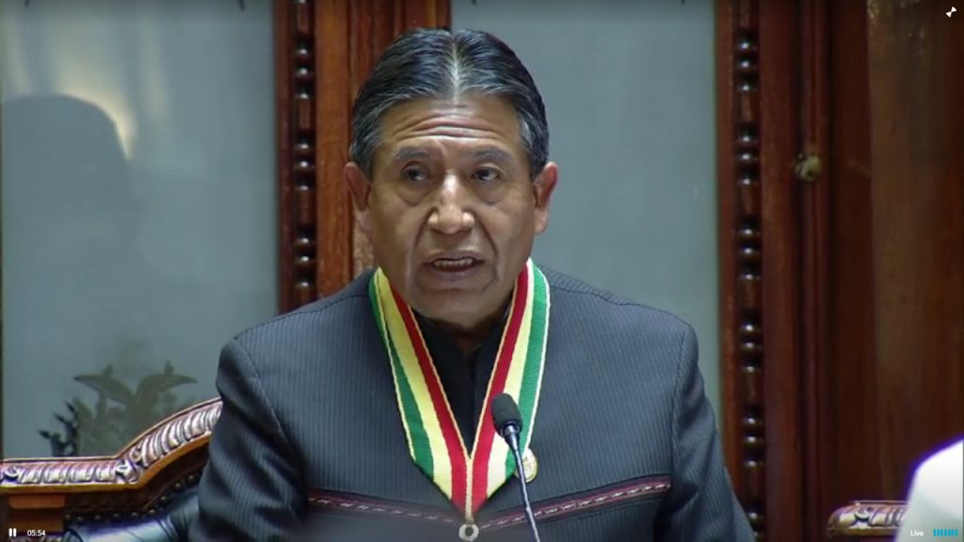
During his years in Morales’ cabinet, Choquehuanca assumed the general secretariat of the Bolivarian Alliance for the Peoples of Our America (ALBA). Bolivia has returned to ALBA after Áñez had withdrawn from the cooperative-oriented alliance of eight Latin American countries. The state has also resumed diplomatic and fraternal relations with Iran, Venezuela, Cuba and Nicaragua. Áñez had also expelled Cuba’s 700 doctors and medical workers.
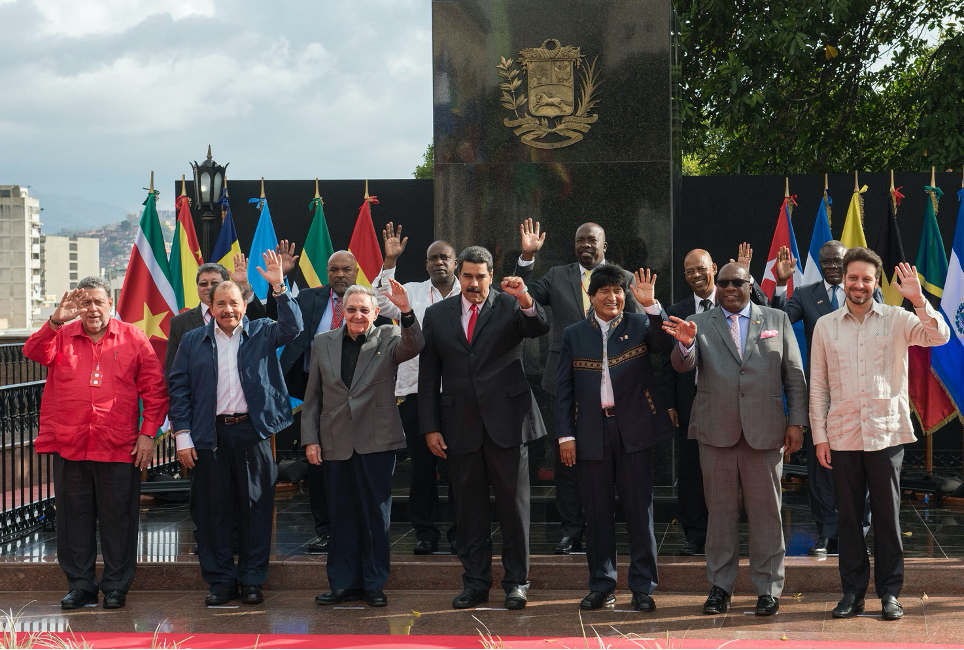
Half the population is indigenous (some sources place the percentage even higher). At the beginning of Morales’ presidency, a new constitution was created with grassroots participation. It recognizes 36 peoples as indigenous, and made three of their languages, along with Spanish, official languages of the nation. Quechua people make up half the indigenous population; Ayamara’s 41%.
Yet of the 17 ministers, only one is indigenous and four are women. Sabina Orellana, a Quechua union activist, was appointed Minister of Cultures, Decolonization and Depatriarchalization.
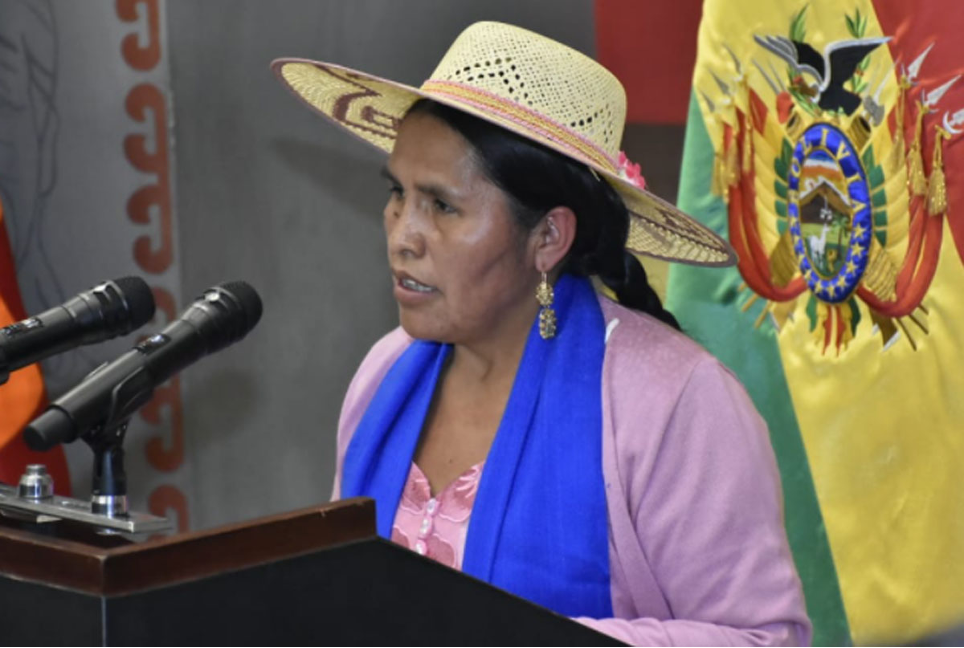
Ten days after assuming the presidency, Arce fired military right-wingers loyal to the coup-makers and to the U.S. He replaced them with officers purportedly loyal to the people and the constitution.
Morales returned to Bolivia from exile the day after Arce was inaugurated, November 8. He resumed his chairmanship of MAS, but is not part of the new government. Morales told his people in the state of Cochabamba, “The transnationals do not forgive us for having nationalized our natural resources…Lithium is why the U.S. backed the coup.”
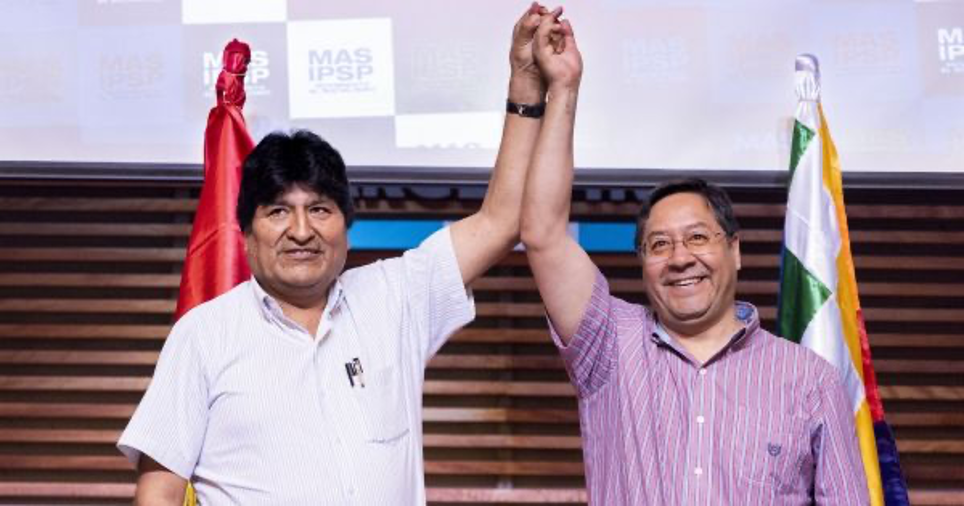
These remarks offer a warning that the new government, despite its landslide election victory, remains vulnerable to subversion from the United States and its Bolivian allies who were behind the 2019 coup and could strike again.
Coronavirus Prevents Full Recovery
Western mainstream media (MSM) have ignored most developments in Bolivia since the election other than some coverage about the coronavirus and floods. MSM puts Bolivia in bed with Russia, because it is supplying Sputnik V vaccine to Bolivia—one of 50 countries to buy this inexpensive vaccine.[2]
The government has also ordered Western-made vaccines from Astra Zeneca, which charges three times more than the cost of the Russian vaccine.
At the beginning of February, 218,000 people had tested positive. The population is 11.5 million. Some 50 people are dying daily. Evo Morales’s sister, Esther, died from the virus at age 70.
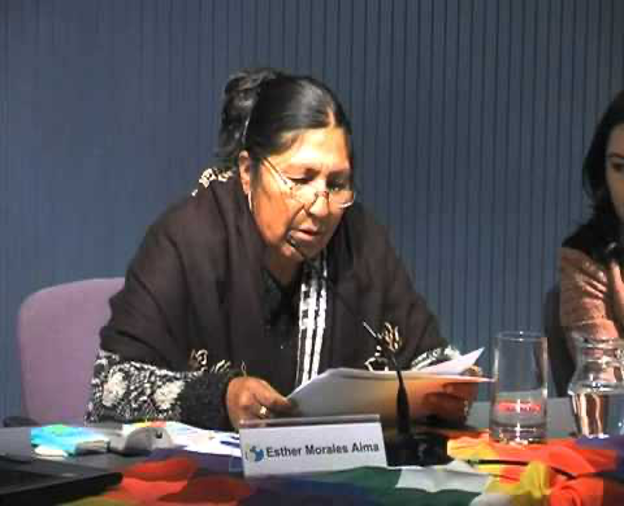
Fearing an economic collapse, Arce has not shut down as much business as many people desire. Health workers are upset. Hospitals are filled to near overflowing. Health workers in the most conservative Santa Cruz region conducted a partial 24-hour strike (February 2), demanding a greater lockdown of society, in order to prevent more spread of the virus and its mutations.
Many people also wish to postpone the planned regional and municipal elections scheduled for March 7. The government intends to maintain the date despite fears of more coronavirus infections.
The Corona epidemic has postponed the legal proceedings of the coup plotters who remain under travel ban. When the proceedings resume, all eyes will be on what happens and the implications will reach well beyond Bolivia.

Stay tuned for Ridenour’s next article which will provide a preview of the Ecuadorian run-off election in April where leftist candidate and frontrunner Andres Arauz led the field with 32 percent of the vote in the general election in February.
[1] MAS was founded by Evo Morales, in 1998, an outgrowth of coca farmers struggles to maintain the indigenous tradition of chewing its leaves (not cocaine) as a stimulant, especially used by chauffeurs. MAS’ struggles included the right to have free access to water, and to change the extreme greedy competitiveness of capitalism.
MAS aspires to Communitarianism—collective decision-making and a cooperative economy, connecting the individual with the community and rejecting laissez-faire policies. Some see this form of a visionary society as “utopian socialism”, or “socialism of the 21st century”. The thought is to avoid 18th, 19th, 20thcentury violent revolutions. Ruling society would be by and for all citizens without capital/corporate dictates. Direct voting at assemblies is the preferred manner to select leaders, who should not become permanent leaders.
Communitarianism is an outgrowth of the pan-hispanic liberation movement led by the Venezuelan military and political leader Simon Bolivar (1783-1830). Insurrections threw out Spanish colonial rule in Venezuela, Bolivia, Peru, Ecuador, and Colombia (Panama). The Gran Colombia was formed in 1821 under Bolívar’s leadership. This federation included much of what is now Venezuela, Colombia, Panama and Ecuador. In 1824, the popular.
[2] The prestigious Lancet medical journal just published its findings that Sputnik V is effective against 91.6 percent of symptomatic Covid-19 cases.
CovertAction Magazine is made possible by subscriptions, orders and donations from readers like you.
Blow the Whistle on U.S. Imperialism
Click the whistle and donate
When you donate to CovertAction Magazine, you are supporting investigative journalism. Your contributions go directly to supporting the development, production, editing, and dissemination of the Magazine.
CovertAction Magazine does not receive corporate or government sponsorship. Yet, we hold a steadfast commitment to providing compensation for writers, editorial and technical support. Your support helps facilitate this compensation as well as increase the caliber of this work.
Please make a donation by clicking on the donate logo above and enter the amount and your credit or debit card information.
CovertAction Institute, Inc. (CAI) is a 501(c)(3) non-profit organization and your gift is tax-deductible for federal income purposes. CAI’s tax-exempt ID number is 87-2461683.
We sincerely thank you for your support.
Disclaimer: The contents of this article are the sole responsibility of the author(s). CovertAction Institute, Inc. (CAI), including its Board of Directors (BD), Editorial Board (EB), Advisory Board (AB), staff, volunteers and its projects (including CovertAction Magazine) are not responsible for any inaccurate or incorrect statement in this article. This article also does not necessarily represent the views the BD, the EB, the AB, staff, volunteers, or any members of its projects.
Differing viewpoints: CAM publishes articles with differing viewpoints in an effort to nurture vibrant debate and thoughtful critical analysis. Feel free to comment on the articles in the comment section and/or send your letters to the Editors, which we will publish in the Letters column.
Copyrighted Material: This web site may contain copyrighted material the use of which has not always been specifically authorized by the copyright owner. As a not-for-profit charitable organization incorporated in the State of New York, we are making such material available in an effort to advance the understanding of humanity’s problems and hopefully to help find solutions for those problems. We believe this constitutes a ‘fair use’ of any such copyrighted material as provided for in section 107 of the US Copyright Law. You can read more about ‘fair use’ and US Copyright Law at the Legal Information Institute of Cornell Law School.
Republishing: CovertAction Magazine (CAM) grants permission to cross-post CAM articles on not-for-profit community internet sites as long as the source is acknowledged together with a hyperlink to the original CovertAction Magazine article. Also, kindly let us know at info@CovertActionMagazine.com. For publication of CAM articles in print or other forms including commercial internet sites, contact: info@CovertActionMagazine.com.
By using this site, you agree to these terms above.
About the Author
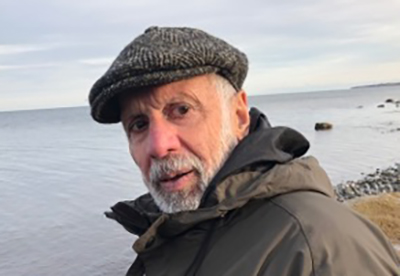
Ron Ridenour is a U.S.-born author and journalist, anti-war and civil rights activist since 1961. After joining the U.S. Air Force at 17, he saw the inner workings of U.S. imperialism first hand and resigned. In the 1980s and 1990’s he worked with the Nicaraguan government and on Cuban national media.
He now lives in Denmark and, in addition to writing a dozen books, has served as a special correspondent and freelance investigative journalist for many publications in the U.S. and several Latin American and European countries—among them: The Morning Star, New Statesman, The Guardian (U.S. and England), Playboy, Liberation News Service, Pacific News Service, Coast Magazine, Qui, Skeptic, Seven Days, and Pacifica Radio.
CAM co-founder Philip Agee wrote commentaries to two of his dozen books: Yankee Sandinistas: Interviews with North Americans Living and Working in the New Nicaragua, and Backfire: CIA’s Biggest Burn. See also: The Russian Peace Threat: Pentagon on Alert and Winding Brook Stories at Amazon and Lulu. Other work can be found at ronridenour.com.
Ron can be reached at ronrorama@gmail.com.



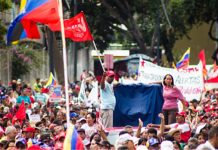

Its hard to understand why even a Keynesian, much less a Marxist, economist would fix the exchange rate. Devaluing the exchange to reduce the cost of exports abroad and increase costs of imports internally is one of the most powerful weapons in the an economic manager’s quiver. Fixing the price of the Bolivian curency in dollars makes as much economic sense as fixing the price of U.S. dollars in gold. I wonder if this “Marxist” got his economic training at the University of Chicago.